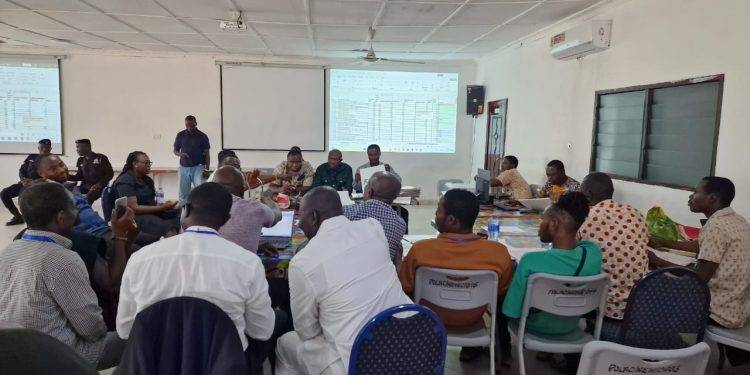Tensions are mounting at the National Police Training School in Tesano, Accra, where the Electoral Commission (EC) is conducting the re-collation of parliamentary election results for four contentious constituencies. These constituencies—Suhum, Nsawam, Fanteakwa North, and Akwatia—are embroiled in disputes over irregularities during the initial collation process in the Eastern Region, necessitating a relocation to Accra under tight security.
The decision to move the collation to Tesano has sparked significant controversy. The EC maintains that this step was necessary to ensure transparency and resolve disputes that arose during the original process. However, the National Democratic Congress (NDC) has raised concerns, questioning the fairness and integrity of the re-collation exercise.
In the Eastern Region, disagreements between party agents and EC officials had led to deadlocks, with both sides contesting the accuracy of the results. Efforts to finalize the collation locally proved unsuccessful, prompting the EC to relocate the process to a neutral and secure environment in Accra.
Critics of the relocation, particularly the NDC, argue that this decision undermines the credibility of the electoral process. According to them, the move disenfranchises local representatives and creates a perception of bias. Deputy General Secretary of the NDC, Peter Boamah Otokunor, expressed his dismay during an interview, describing the situation as troubling and alleging procedural breaches.
"We were invited to the National Police Training School to continue with the collation. Incidentally, our executives from Nsawam and Suhum were present, but Akwatia was not represented when I arrived. To my surprise, they had already begun the collation exercise without the other side,†Otokunor explained. “I asked that they stop the process because proceeding without all parties present is unlawful.â€
Otokunor further claimed that his request for a brief pause to allow Akwatia representatives to join the process was denied. “I pleaded with the Regional EC Director for two hours to bring in the Akwatia officers, but he refused, citing orders from above,†he added.
The ruling New Patriotic Party (NPP), on the other hand, has defended the EC’s actions. NPP representatives argue that the relocation was necessary to restore order and ensure that the collation process is completed without further delays or disruptions.
The contentious nature of the re-collation reflects broader concerns about Ghana's 2024 parliamentary elections, which have been marked by heightened tensions, disputes, and allegations of irregularities. The elections, though widely regarded as competitive, have highlighted challenges in the electoral system that many believe need urgent reforms.
The atmosphere at Tesano remains charged, with heavy security measures in place to prevent potential clashes between supporters of the NDC and NPP. Representatives from both parties are closely monitoring the process, with the EC working to finalize the results as quickly and transparently as possible.
While the NPP has expressed satisfaction with the EC's handling of the situation, the NDC has continued to criticize the process, calling for greater accountability. The opposition party has vowed to challenge any irregularities in court if necessary, signaling that the tensions surrounding the affected constituencies may not subside immediately.
The stakes are particularly high in constituencies like Akwatia, where electoral outcomes have significant implications for both local governance and the national political landscape. Historically, Akwatia has been a stronghold of the NPP, but the disputes surrounding this year’s elections have raised questions about voter confidence and the need for more robust electoral oversight.
Observers have called for a thorough review of the factors that led to the disputes and delays in these constituencies. Many believe that addressing the root causes of these issues is essential to preserving the integrity of Ghana’s democratic processes. Electoral experts have suggested reforms such as improved training for election officials, better communication between stakeholders, and the adoption of advanced technologies to enhance the accuracy and efficiency of result collation.
As the re-collation continues, all eyes remain on the National Police Training School, where the EC faces the enormous task of delivering credible results amidst a deeply polarized atmosphere. The outcome of this process will not only determine the winners of the disputed seats but also influence public perceptions of Ghana’s ability to conduct free and fair elections.
For now, the future of Suhum, Nsawam, Fanteakwa North, and Akwatia remains uncertain. What is clear, however, is that the controversies surrounding these constituencies will have lasting implications for Ghana's political landscape, potentially shaping the discourse around electoral reforms and democratic accountability in the years to come.




No comments yet
Be the first to share your thoughts!